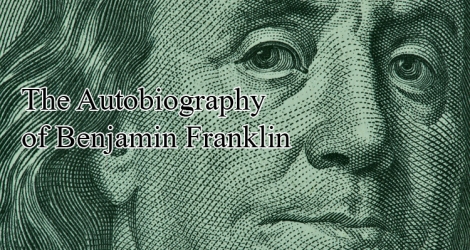The Autobiography of Benjamin Franklin by Benjamin Franklin
Unabridged; narrated by Grover Gardner; Findaway MediaWhat an interesting man! Benjamin Franklin wasn’t just a founding father of America, but he was the founding father of so many innovations, institutions, and more that have affected the whole world. His autobiography is fascinating as he lays out his life story. However, it ends quite abruptly. I did a little research to find out why. Basically, B. Franklin wrote his autobiography over many years in a few different stints. Firstly, he is writing to his son and posterity. Then he continues as others requested him to. Again, other admirers ask him to share more, so he does. Finally, he adds a little bit more just before he dies.
It is honestly surprising he had time to write what he did since he had one of the busiest lives ever. He was a leading or establishing member of several organizations and associations including intellectual and debating clubs, the state assembly, volunteer fire departments, academies, and military outfits in addition to being Post Master, inventor or natural philosopher as he called it, printer, newspaper editor, author of several pamphlets on myriad subjects and so much more. How he had time for anything more like raising a family is astonishing.
Unfortunately, his narrative doesn’t take us all the way to the American Revolution. It does, however, demonstrate the mounting tensions between the colonies and the crown and his involvement in the disputes. There were a few things that stood out to me such as his brief endorsement of inoculations or vaccinations.
Another is his list of 13 virtues, which is his list of virtues every person should possess. His list originally consisted of just 12, but after a Friend (a Quaker) told him he was too proud he added humility to the list.
Franklin seemed very practical in his adoption of the virtues admitting it would be folly to attempt to be perfect in all at one time. So, he set up a plan to perfect a new one each week over thirteen weeks. I’m sure had he done further experiments he would have found that going a bit longer with each would’ve helped in the retention of the virtuous habits. He does seem superhuman though, so maybe it only took him a week to develop a routine or habit unlike 30 days for the rest of us.
His list of virtues is as follows:
- Temperance – Eat not to dullness; drink not to elevation.
- Silence – Speak not but what may benefit others or yourself; Avoid trifling Conversation.
- Order – Let all your things have their places; let each part of your business have its time.
- Resolution – Resolve to perform what you ought; perform without fail what you resolve.
- Frugality – Make no expense but to do good to others or yourself; i.e., waste nothing.
- Industry – Lose no time. Be always employed in something useful. Cut off all unnecessary actions.
- Sincerity – Use no hurtful deceit; think innocently and justly, and, if you speak, speak accordingly.
- Justice – Wrong none by doing injuries, or omitting the benefits that are your duty.
- Moderation – Avoid extremes; forbear resenting injuries so much as you think they deserve.
- Cleanliness – Tolerate no uncleanliness in body, clothes, or habitation.
- Tranquility – Be not disturbed at trifles, or at accidents common or unavoidable.
- Chastity – Rarely use venery but for health or offspring, never to dullness, weakness, or the injury of your own or another’s peace or reputation.
- Humility – Imitate Jesus and Socrates.
As I mentioned above, he was a member of several private clubs including one called the Junto. This group of friends got together to discuss various topics they had researched and written essays on. They debated the topics with each other but weren’t allowed to use definitive words such as always or never and had to respond in a respectful manner. I liked this because I’ve been thinking about doing something like this myself to encourage the habit of study, debate, scholarship and intellectual conversations.
Perhaps one of the biggest stand-outs from his autobiography is how honest and sincere he seems (one of the virtues). At times he sounds a bit boastful because he did this or that or made something happen. At other times he confesses his errata (a new word I learned from this book meaning mistakes or errors, coming from his profession’s nomenclature; the singular is erratum) and what he learned from them.
B. Franklin was also a master of persuasion, especially in writing. It is amazing how much he was able to change or institute into law because of this ability. One of his qualities he claimed to have that I highly admire was knowing when to keep his mouth shut and when to open it including when to take credit for something or remain anonymous.
I wish he had finished his story or at least gotten further on with some of the most exciting and world-altering events of his lifetime were quickly approaching. I guess I’ll just have to find the best biography to get that part. Only problem is it won’t be written in his own words or from his perspective.



